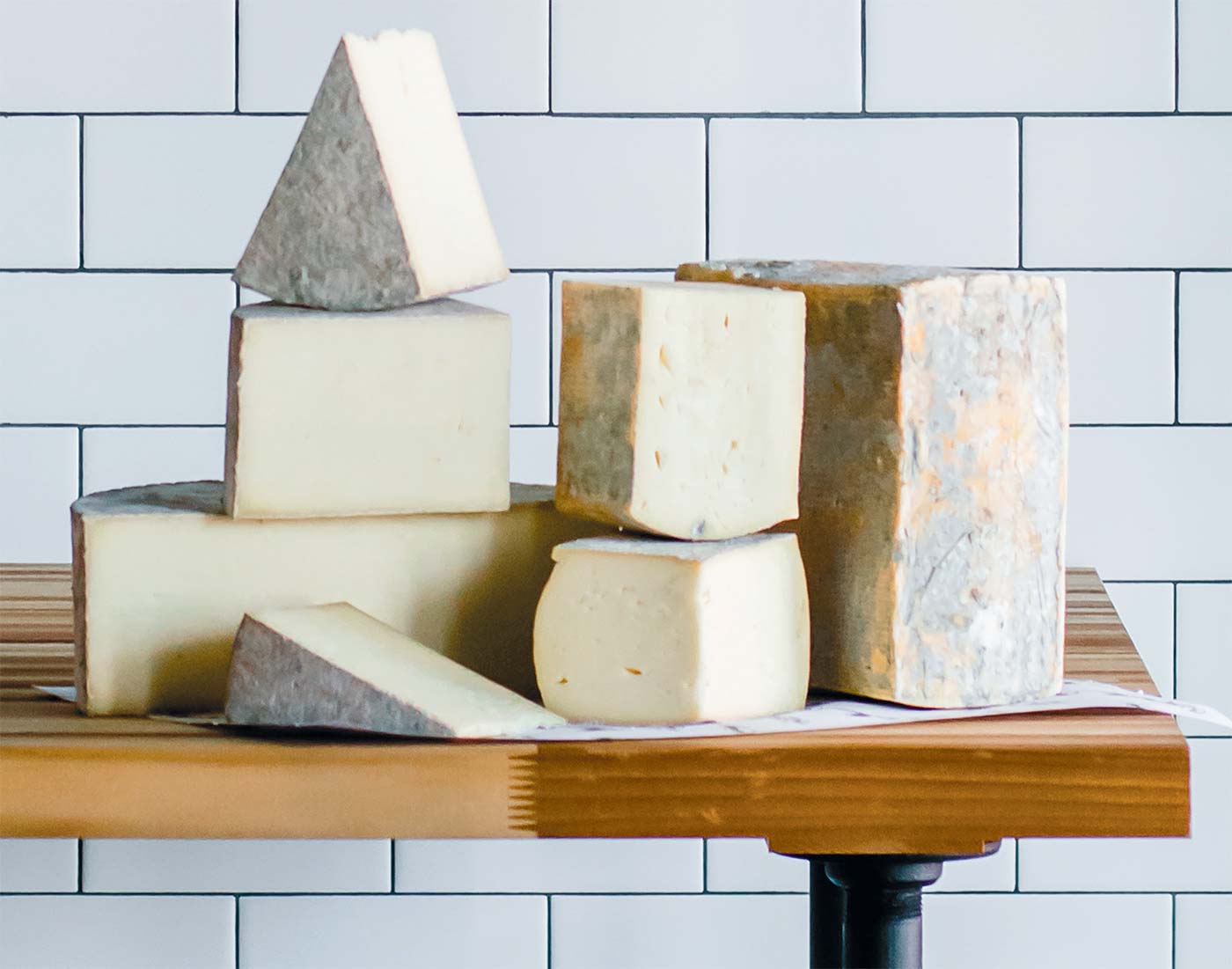Mystic Cheese Company connects farm & art to make delicious, world-class cheeses
You know when people say, “It’s in your blood”? Well, for Brian Civitello, co-owner and founder of Mystic Cheese Co., making cheese comes pretty close to the core of his ancestry. That realization became very clear when his grandmother recently gave him an item belonging to his grandfather, who had died after Brian’s first birthday. The gift passed down to Brian was, of all things, a cheese “trier” that screwed onto the bottom of his grandfather’s cane!
Today, Brian, along with co-owner Jason Sobocinski, has finally put down his cheese making roots and they’re eager for people to come to Groton and try their cheese. It’s crafted with passion and years of experience and a heck of a lot of hard work. The terms “maker’ or “artisanal” sound great and romantic until you realize how much actual work is necessary to produce a block or wheel of cheese. “It's hard to nd people who want to work in cheese making,” Brian says. “It’s about 90% cleaning and only about 10% cheese-making.”
But Brian knows what it’s like to put in the hard work. He and his family grew up in farming, on the 50-acre farm in Salem his Italian grandfather owned and worked many years ago. As a matter of fact, the farm became the interior of the land and the edges were carved out for the children and their families, who are all still there today. “Maker” was a natural role for members of this family long before the term became trendy. In addition to his grandfather’s resourcefulness, Brian says, “my dad raises beef cows. My cousins are doing maple syrup. We still grow grapes. I sort of grew up in this interesting foodie type environment.”
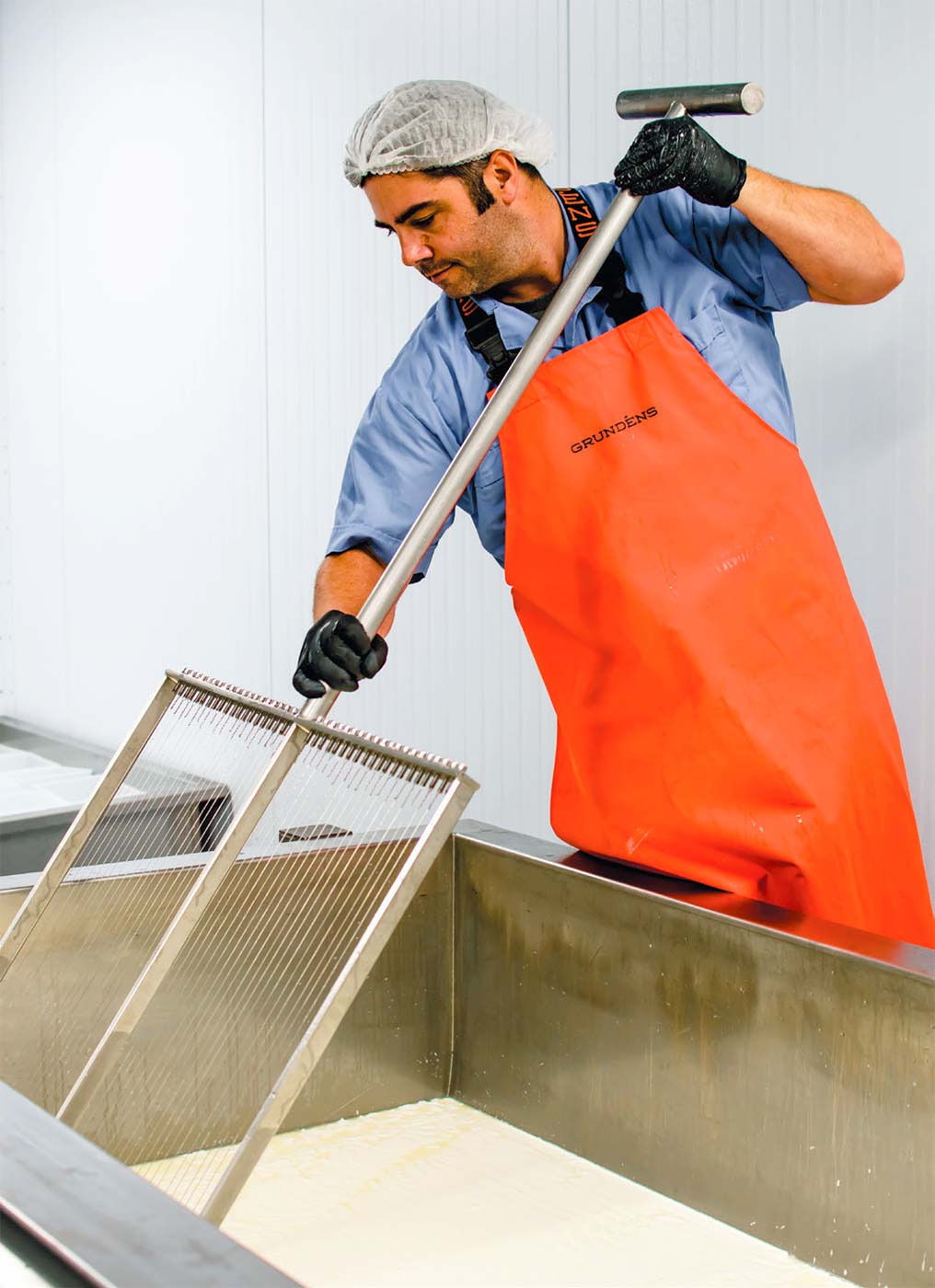
So, even though his path to Mystic Cheese was not quite a straight line, his ties to the land were always there. Like many of us, it often takes moving far away from something before we can come back and fully embrace it. Brian spent a bit of time in a band and with a record label in Boston before realizing he could contribute to what was becoming a real food movement. He thought, “I know how to do all that.” He first considered making bread, but the mechanics, the rhythm, and the “animal husbandry component of cheese making” really drew him in. He says, “that very coming together of earth, animal, and food made sense.” So, he sold the record label to focus on bees, gardens, and ultimately cheese.
Brian threw himself into his passion and became a fervent scholar in the world of cheese and its masters, spending much of his time traveling and working with numerous small and large organizations. He even worked with the prestigious, highly regulated Parmigiano Reggiano in Parma, Italy, in and around his schedule as an agricultural business student at UConn. Every break or vacation he returned to learn the history of cheese, serve as an apprentice, and to do so from the best.
For fifteen years, Brian sharpened his skills as a cheese maker while learning more about the business side of things. He spent time with creameries and farms in Oregon, in Virginia, and back home at Beaverbrook and Calabro Cheese. He first learned how to manage the process of making 5,000 pounds of cheese a day then worked up to 70,000 pounds a day! He consulted helping cheese factories out t their business with the proper equipment. He launched a business with cheese pods: mobile, stand-alone cheese factories that were actually made from recycled, renovated shipping containers!
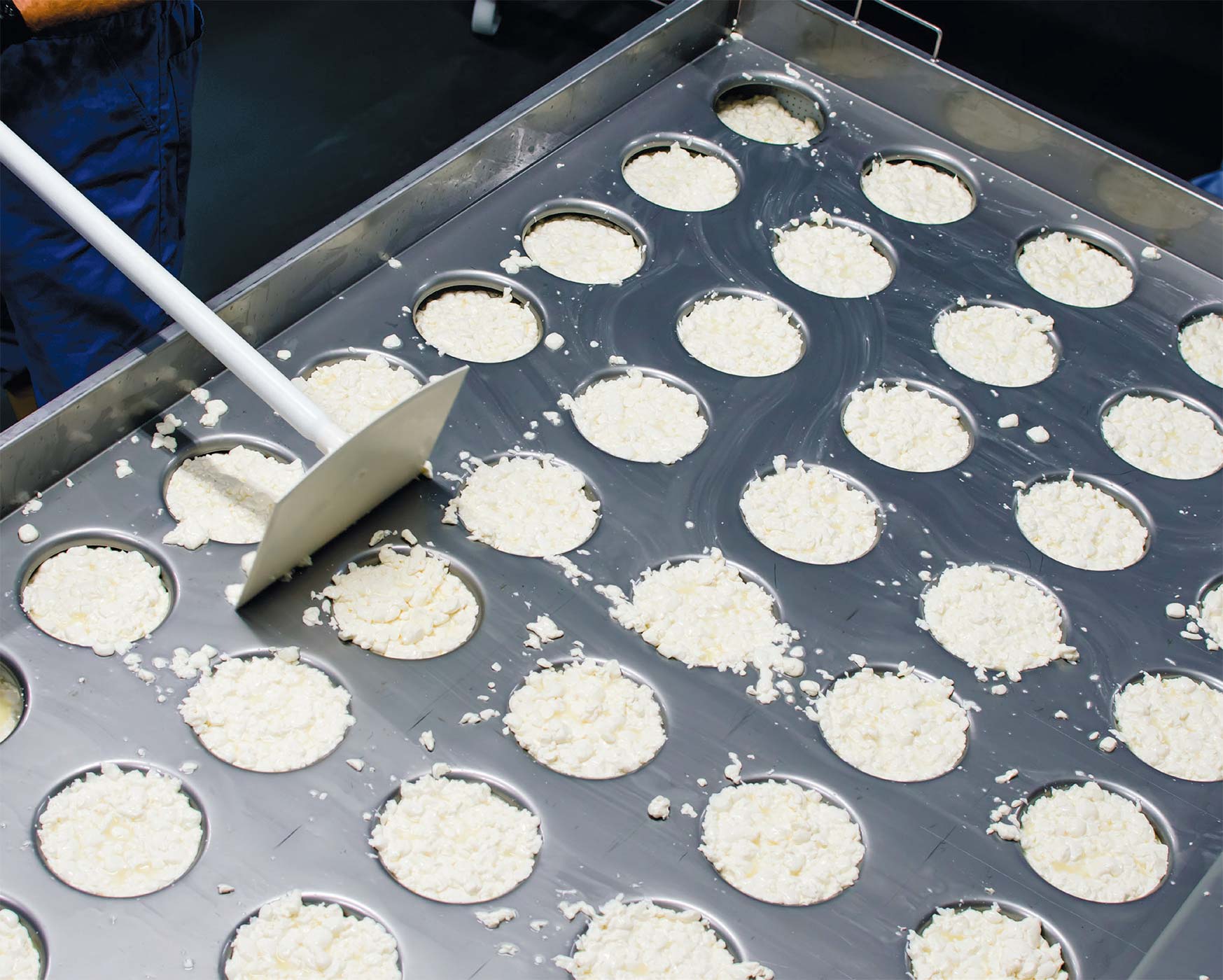
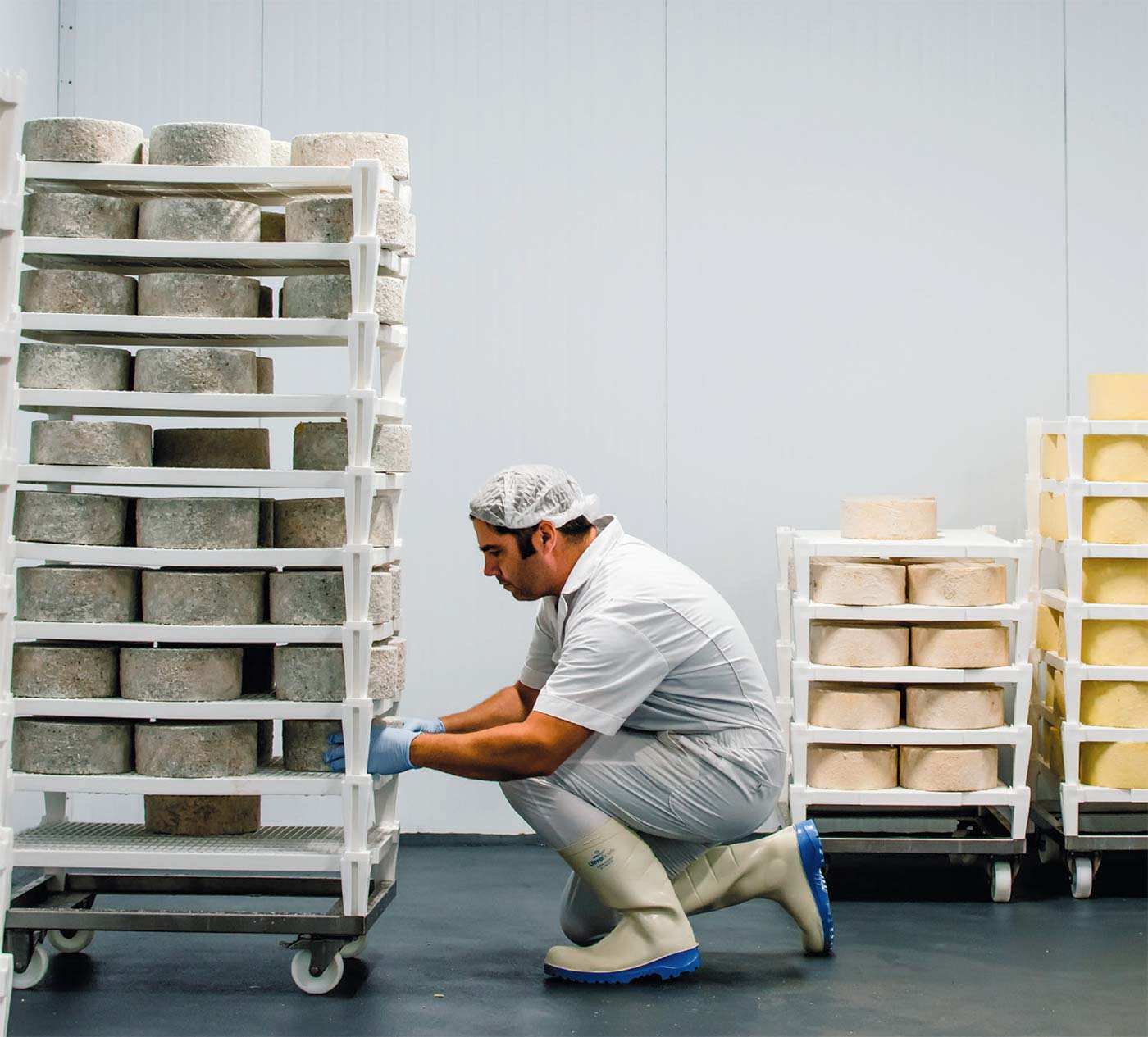
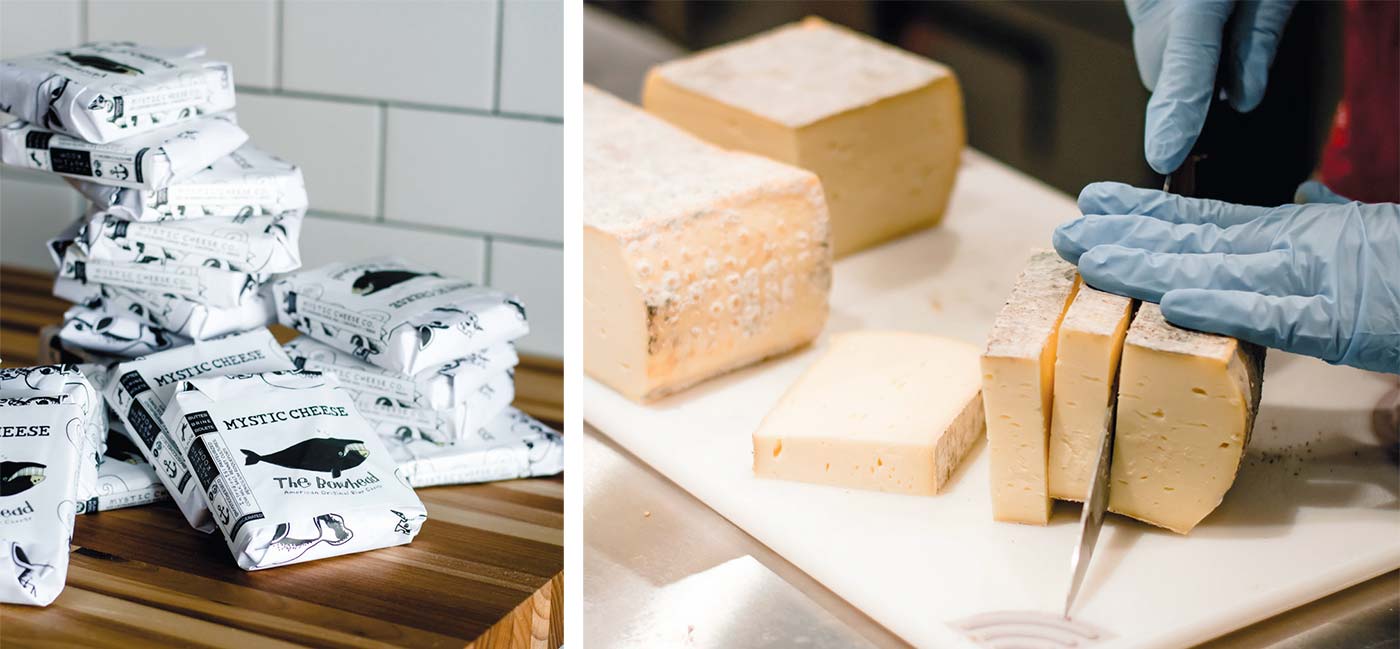
Brian making cheese and tending to work in progress. The Bowhead Blue ready to take home.
But eventually Brian sought a place to call home, a house of cheese, where he could both experiment and make prodigious amounts of cheese. So, in 2013 he and Jason joined forces. As for inspiration, they both recalled the charm of Mystic, of field trips as kids. To be by the water, the seaport, its whaling heritage, just made sense for the soon to be Mystic Cheese Company.
Today, all of the milk used at Mystic Cheese comes from the family farm of Jeff and Alexis Cone - River Plain Dairy Farm in Lebanon. Like Brian, farming is in Cone’s blood, and Alexis is from a long line of dairy farmers. Cone is the fourth generation of farmers from the land. It is a quintessential family operation and to form such a collaboration was crucial to Brian. He knows how difficult it is, especially today, with trends, technology, and changing tastes to survive as a family farm. “I mean, you've got to milk 300 to 400 cows just to make a living nowadays,” says Brian. So, Brian is happy to a pay a premium because the quality of Mystic’s cheeses is directly connected to the cows in the pasture at River Plain.
Awarded for their pasturing practices, the River Plain Holsteins are in pristine health, which directly translates to optimal fat and protein content in the milk, and thus, the cheese. But parameters of cheese milk versus drinking milk are quite different. Brian remarks that the ultimate goal would be to have the farm utilize a blend of Holstein and Jersey cows for the highest possible fat and protein content to ensure the smoothest, most buttery flavor and texture. However, the brown Jersey cows don’t produce as much milk which would hinder Jeff's production. So, it’s all a careful balance.
Another unique factor is that for Brian, “Every cheese we make, I have to be able to use in my kitchen.” It is important to me to make cheeses that cooks will use for their flavor and texture. It goes beyond serving a slice or chunk on a plate. In terms of flavor profiles, Brian prefers to stay as close to possible to the bright, clean, pure style of Italian cheeses.
From their first line with literary references like Melville, Sea Change, Melinda Mae, and Twain to Bowhead Blue which turns non blue cheese fans into believers, Mystic Cheese Company is taking the experience in new directions. In the shop, customers can order boards with an array of tastes including guest cheeses to satisfy all palates. Tastings and classes round out the experiential opportunities that makes Mystic a most delightful destination.
They are even experimenting with a style of cheddar that goes back to methods from hundreds of years ago. Brian continues to study, so when he came across this method, on the verge of being extinct, he had to try it. It is much more work and with lower yields but worth the effort he says.
With more traditional or modern cheddars, the cheese curds are cooked in a way to relieve some of the moisture. But it's a very fast process, about seven hours. This older process takes much more time, more tools, and more pressure to remove even more of the moisture. This extra effort results in a smoother yet more crumbly product. The goal is to release a special reserve of the product later this year.
The relationship with the farm, the mix of art and science, and the opportunity to create amazing cheeses are what drives Brian and Mystic Cheese. It’s a magical combination of doing what he loves while connecting to his past. Thanks Grandpa.



